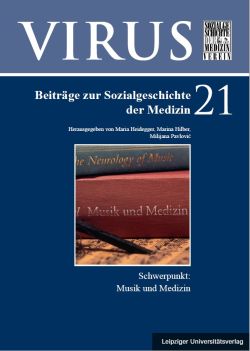|
 |
Das aktuelle Schwerpunktheft, herausgegeben von Maria Heidegger, Milijana Pavlović und Marina Hilber, ist dem interdisziplinären Dialog zwischen der Medizingeschichte und der Musikwissenschaft gewidmet. Aus beiden Perspektiven werden Zusammenhänge zwischen Musik und Medizin und verschiedene Möglichkeiten darüber ins Gespräch zu kommen, beleuchtet. Anhand konkreter Fragestellungen wird etwa nach den ambivalenten Wirkungen des Musikalischen gefragt und dabei die gesamte Bandbreite von therapeutisch, beruhigend und erheiternd bis zu aufwühlend, quälend und verstörend berücksichtigt. Bewusst wird im Intro – entgegen des Mainstreams – nicht etwa die therapeutische Qualität des Musikalischen, sondern die „dunkle“ Seite, der mögliche Missbrauch der Musik, betont (Josephine Morag Grant). Die Autor:innen des Schwerpunktteils des Heftes liefern Variationen zu unterschiedlichen historischen und geschlechtsspezifischen Vorstellungen über Körper, Stimme und Resonanzen von Musik (Marie Louise Herzfeld-Schild, Till Stehr), sie analysieren Musikwerke in medizinischen Räumen wie Kurbädern und Sanatorien (Christina Vanja, Lorenz Adamer, Irmtraut Sahmland und Aleš Verner), fragen aus dem Blickwinkel der historischen Sound Studies nach Klangerfahrungen und nach den Quellen, in denen sich etwa Patient:innen sowohl als Musikhörende als auch als Musikproduzierende aufspüren lassen (Maria Heidegger), nach Musik als Medium oder als Bestandteil von Diskursen in medizinischen Vermittlungsprojekten (Martina Hochreiter, Timur Sijaric) oder nach Aufführungsängsten von Musiker:innen (Regina Thumser-Wöhs) und nach den biografisch fluktuierenden Grenzen zwischen musikalischem Beruf und therapeutischer „Berufung“ (Michaela Krucsay). Das Outro des Thementeils bilden Berichte über aktuelle Projekte im Schnittfeld von Musikwissenschaft, Sound Studies und Geschichtswissenschaft.
|

